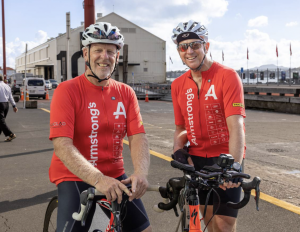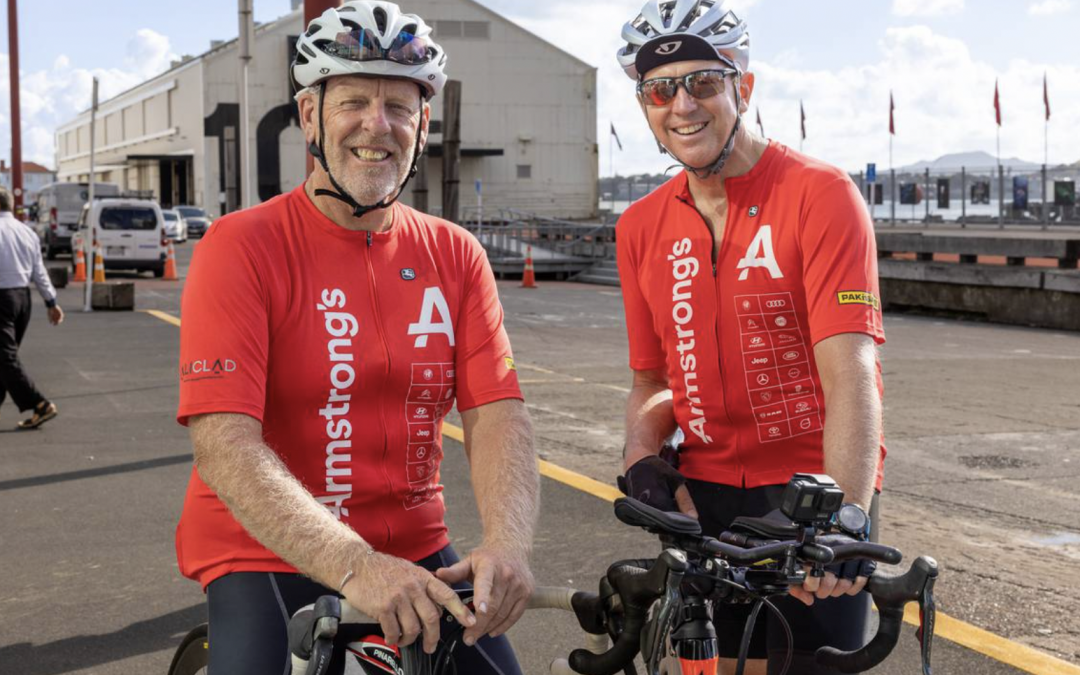
It’s been a tough couple of weeks. Many of our communities have been hammered. City people. Rural people. Coast people. Good Kiwi people. Nature can be unforgiving.
Many of those people now need help and that help will come in different forms.
Some will need immediate response. Others will need long-term support. Support to rebuild what’s been broken — shattered households, businesses and lives.
Some will need financial support. Others, physical support to help with the overwhelming task of rebuilding. Plenty will need their wellbeing supported. A mood change can happen quite quickly. Mental health can take longer.
It’s not just individuals. This disaster is about communities, farms, orchards and homes. But it’s also about infrastructure: roads and bridges; schools; power supply and cellphone coverage. And drainage.
This time tomorrow, I’ll be driving, winding my way through Northland’s fractured roading network. I’ll be accompanied by six fellow-riders and a couple of drivers. Our destination will be Cape Reinga. It’s a trip that’s been in the planning for almost 12 months. Ever since we did the last one.
Our goal is to cycle the length of New Zealand again. Two of us did it last year and raised over $200,000 for mental health and prostate cancer. Our goal this year is to raise $400,000.
Despite the country’s collective recessionary jitters, the fundraising has started well. New Zealanders can be generous people. But we need to raise twice as much as we did last year. And with the events of the past two weeks, the cause just became even greater.
Our team have had discussions this week about whether we should go or whether we should stay home. Should we be cycling while people are suffering?
I’m not sure there’s a right answer. But the reality is that there’s nothing to be achieved by staying home. Sure, there’s a real reluctance to “get in the way” of the clean-up effort, particularly up north, which is the only part of the country that will have damage from the cyclone and our presence in common.
But we might also bring some goodwill and cheer to communities having difficulty. We have to remember the overall objective, to raise as much money as we can for mental health and prostate cancer. In doing so, we’d like to overachieve our fundraising target so we can contribute to the long-term challenges in the needy communities that have been affected by the weather over the past two weeks.
There’s plenty of talk about cancel culture, and sometimes it seems that we’ll close the schools and the Harbour Bridge and tell people to stay home whenever there’s a hint of trouble. But I’d like to see us return to being the country that can rather than the country that can’t. Because Kiwis are good at this stuff. We’re good at stepping up and supporting our neighbour or our mate when the going gets tough. We’re the little guy that fights the odds. Who punches above their weight.
So we decided to get on with it. That’s what the farmers would do.
We did this trip last year with the same intent. To cycle from Cape Reinga to Bluff raising money for farmers’ mental health and for those suffering from prostate cancer. Men, good men. Farmers and city slickers alike. People like my mates and me. We did it for our four mates who’ve been dealing with a prostate cancer diagnosis, and Paul’s brother who is no longer with us.
There are plenty of outstanding charitable efforts for women and children. Even animals have their charity champions. Nothing that we say or do is intended to minimise the importance of those charities and those they serve. But sometimes, men need help too.
One of our mates was due to support us last year, but a cancer diagnosis had him receiving treatment by the time we hit the road. This year, the same thing has happened. Another mate. Another diagnosis. As one of our sponsors reminded me, our generation is in sniper alley!
Paul Muir is my buddy whose family tragedy started this thing. Last year the two of us did the ride together. This year we have four additional cyclists and a support team of 20 helping us. Each rider is trying to raise $50,000 for our charities. Everyone pays their own costs. Even those driving our support vehicles for a few days have to pay for their flights to meet us and their motels and meals once they join us. It’s a team effort.
That way, every dollar raised goes to the charities. Our principal causes are once again Farmstrong, the mental health charity for farmers, and the Prostate Cancer Outcomes Registry. Last year we were able to give each of them $100,000 and we’ve been impressed with their use of the money. We’re delighted to continue helping them to make a difference in the lives of men.
With the Covid-induced collapse of our tourism industry, the farmers and growers of this country largely keep us in the fight on the global economic battlefield. Year in, year out, despite uncertain export markets, droughts, floods, bushfires and crop disease they turn up and deliver for a nation that is over-reliant on the export receipts they generate. They can sometimes be victimised by those who blame them for the woes of the planet or those who seek to push more bureaucracy and compliance onto their already risky business model.
As we have been reminded in the past two weeks, theirs is a business that is highly reliant on the weather. In addition, they’re challenged by global markets, commodity prices, currency fluctuations, debt levels and interest rate movements.
But they also face another challenge. Isolation brings loneliness. Out on the land all day, with no one to talk to but the messages going around in your own head. All day to think about some of those challenges and to grasp for solutions.
That’s where Farmstrong comes in. Farmstrong runs a rural wellbeing program for farmers and growers and helps farming families and their workers to develop habits that improve their personal wellbeing and day-to-day performance. They have books, online programs and meetings where farmers share stories and experiences with each other, stories that help people cope.
This week I spoke to Farmstrong’s national project leader Gerard Vaughan about Northland and Hawke’s Bay. He stressed to me that his team are not intended to be first responders, but they’re already planning how they can respond to the flooding’s long-term impact on farmers and growers. I promised we’ll do what we can to help.
The Prostate Cancer Outcomes Registry (or PCOR) is a different type of organisation, but no less important. Prostate cancer is as prevalent in men as breast cancer in women. It’s not more important but it is as important. Us blokes aren’t very good at looking after ourselves or even talking to each other about looking after ourselves. We’d rather talk about the new building we’re working on, the sports results, or the flavour of the beer.
Whenever a man is diagnosed and treated for prostate cancer, the medical system collects his data. But until recently we haven’t done anything with that data. And yet properly interpreted, that information can inform specialists on recovery rates, responses to treatments, and the likelihood of recurrences. That’s where the PCOR comes in. Because men don’t talk much, turning data into information means at-risk communities including rural men, and Māori or Pasifika men, in particular, can be identified more readily and proactively targeted and supported.
Whether the problem is inside our heads or closer to the bike seat, a common theme is that men don’t talk about this stuff to each other. Fellas, we need to be better than that.
So if you see us out on the road, stopped at a country cafe, or at the pub on our way through the country, please feel free to stop for a chat. We’ll talk about the job or the sports results. But we’re also happy to talk about you.
Last year’s Bike for Blokes trip left us with memories and stories from every town. There was an old Māori fella in Kaitaia who asked what we were doing there. We told him the story and he wandered away. When he returned, he gave us $20. At the other end of the country, just out of Lumsden, a driver pulled his truck and trailer rig to the side of the road and came over to us with $100. He simply said, “just heard you on the radio. Thanks for what you’re doing”. We’re looking forward to more stories and more conversations. We’ll see you on the road.
– Bruce Cotterill and Paul Muir are cycling the length of New Zealand again in 2023 to raise awareness and funds for charities that support men’s health. You can follow them, and donate at www.bikeforblokes.co.nz
This article first appeared in The New Zealand Herald on Saturday 18th February 2023.

Recent Comments